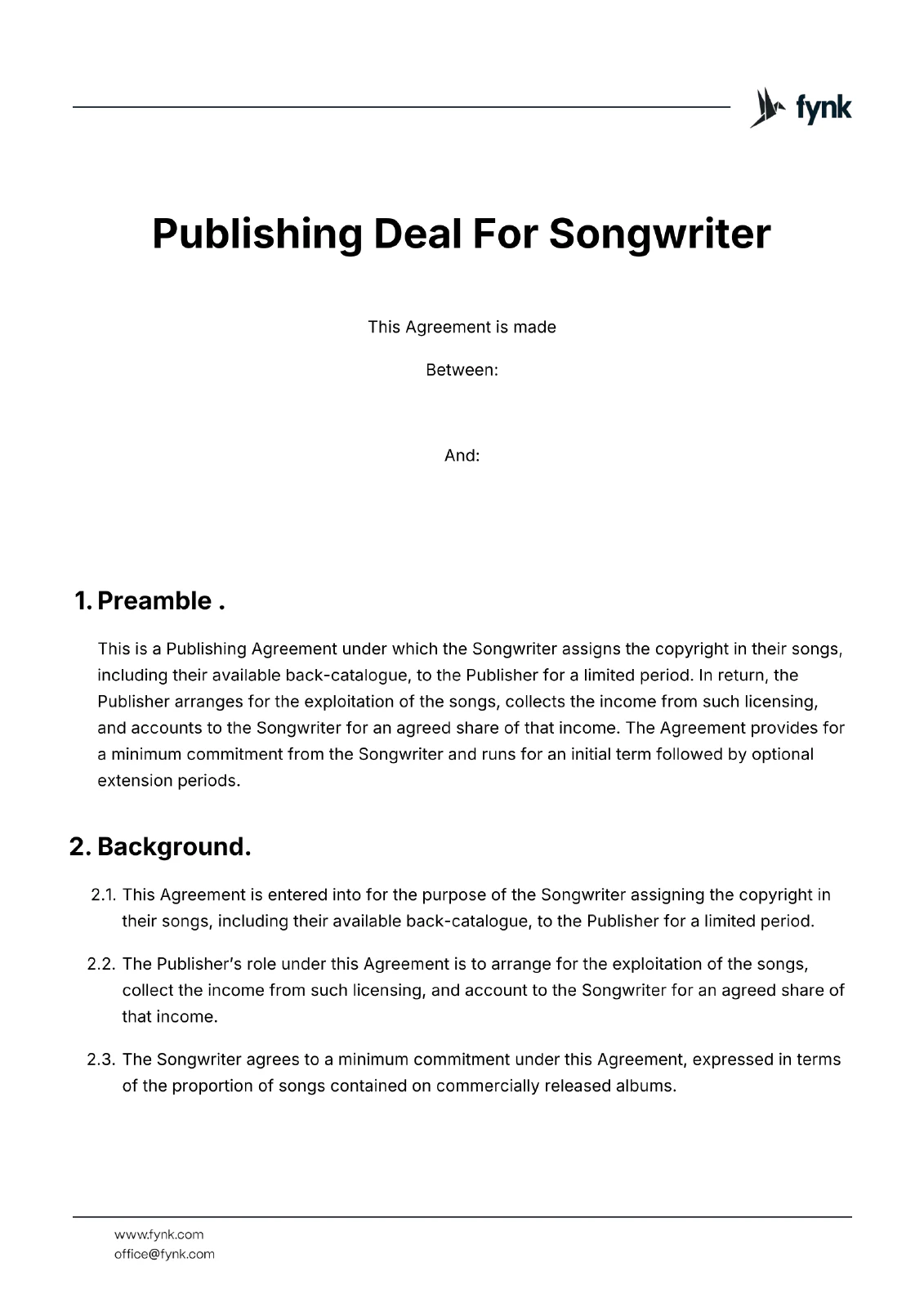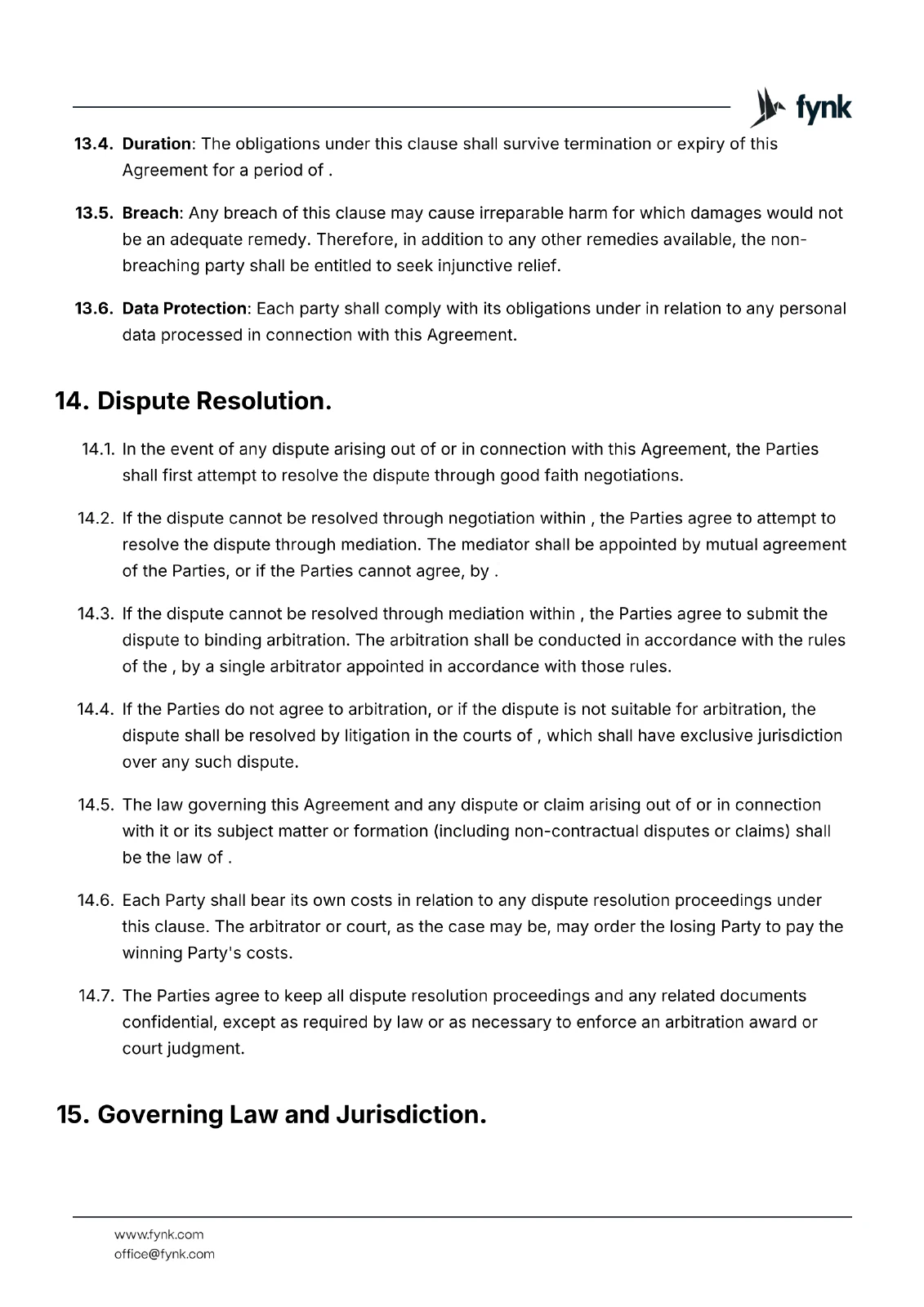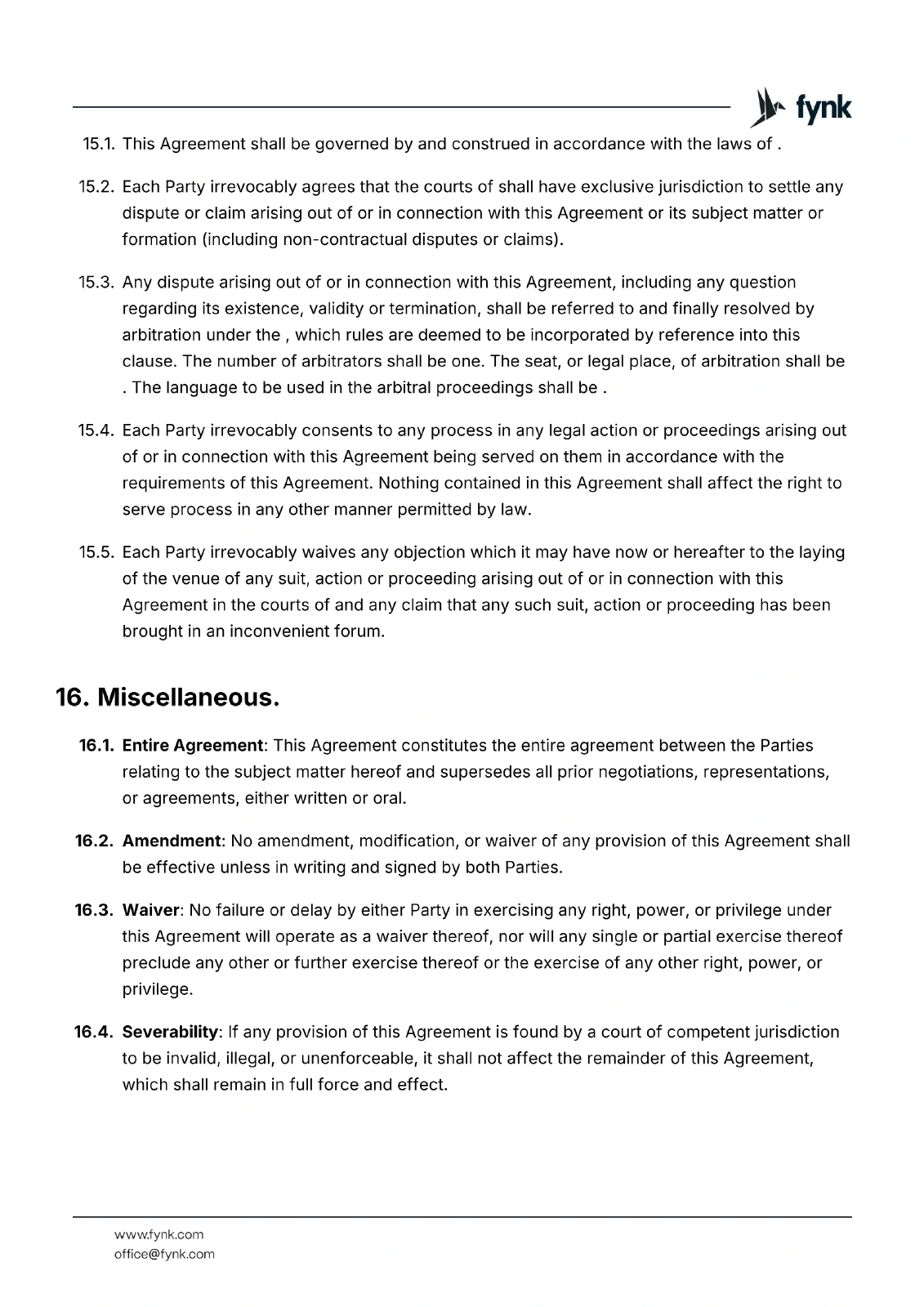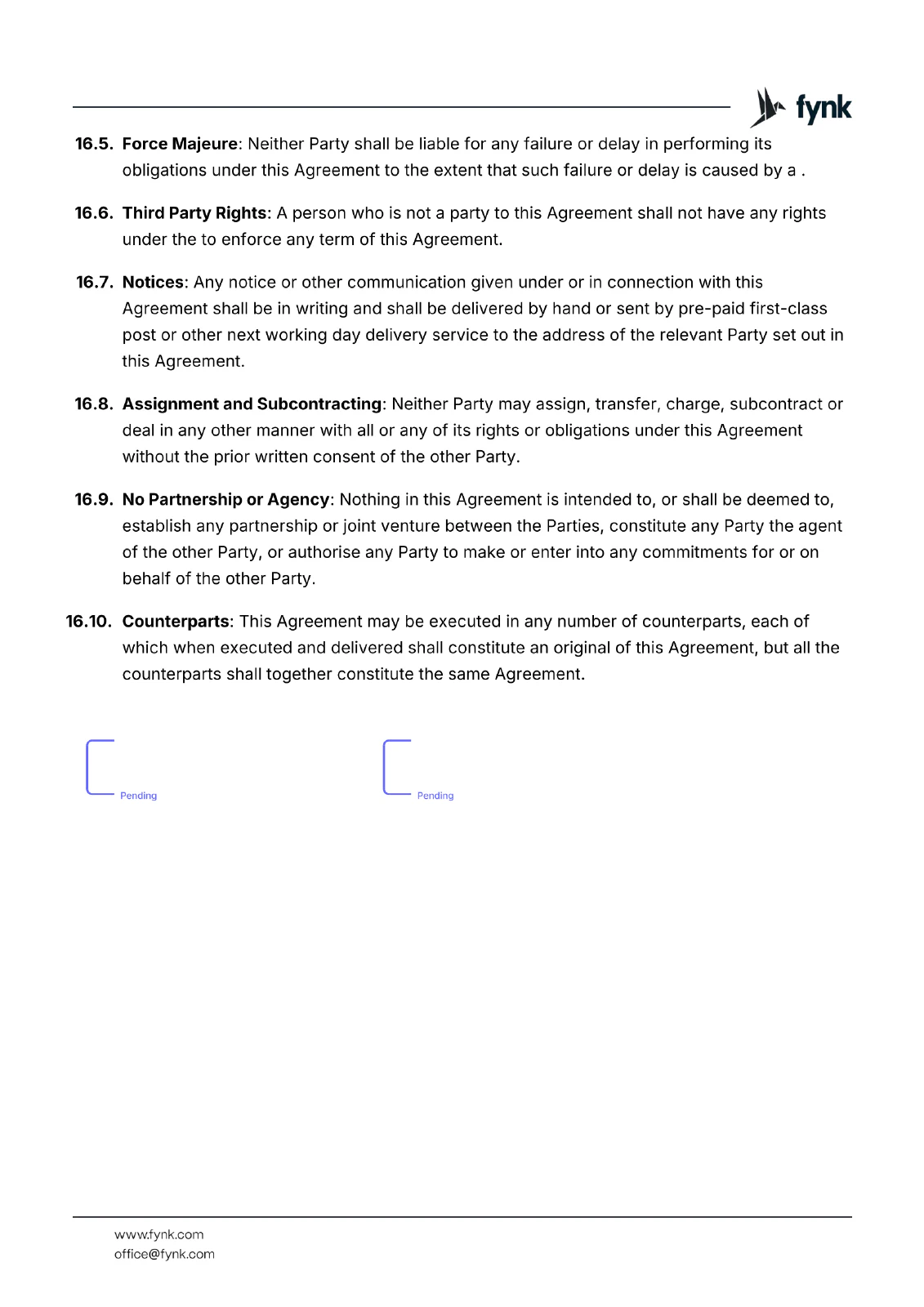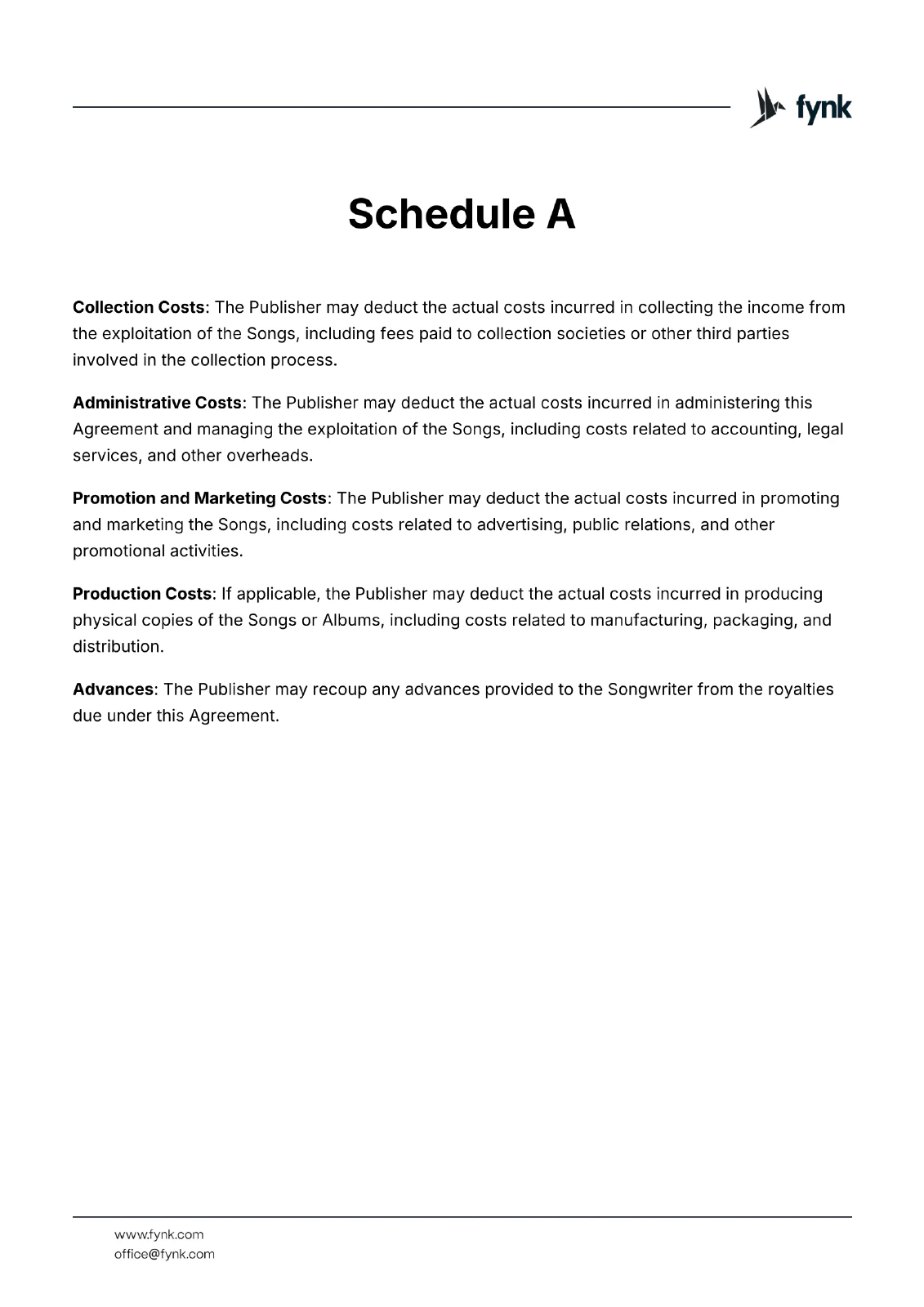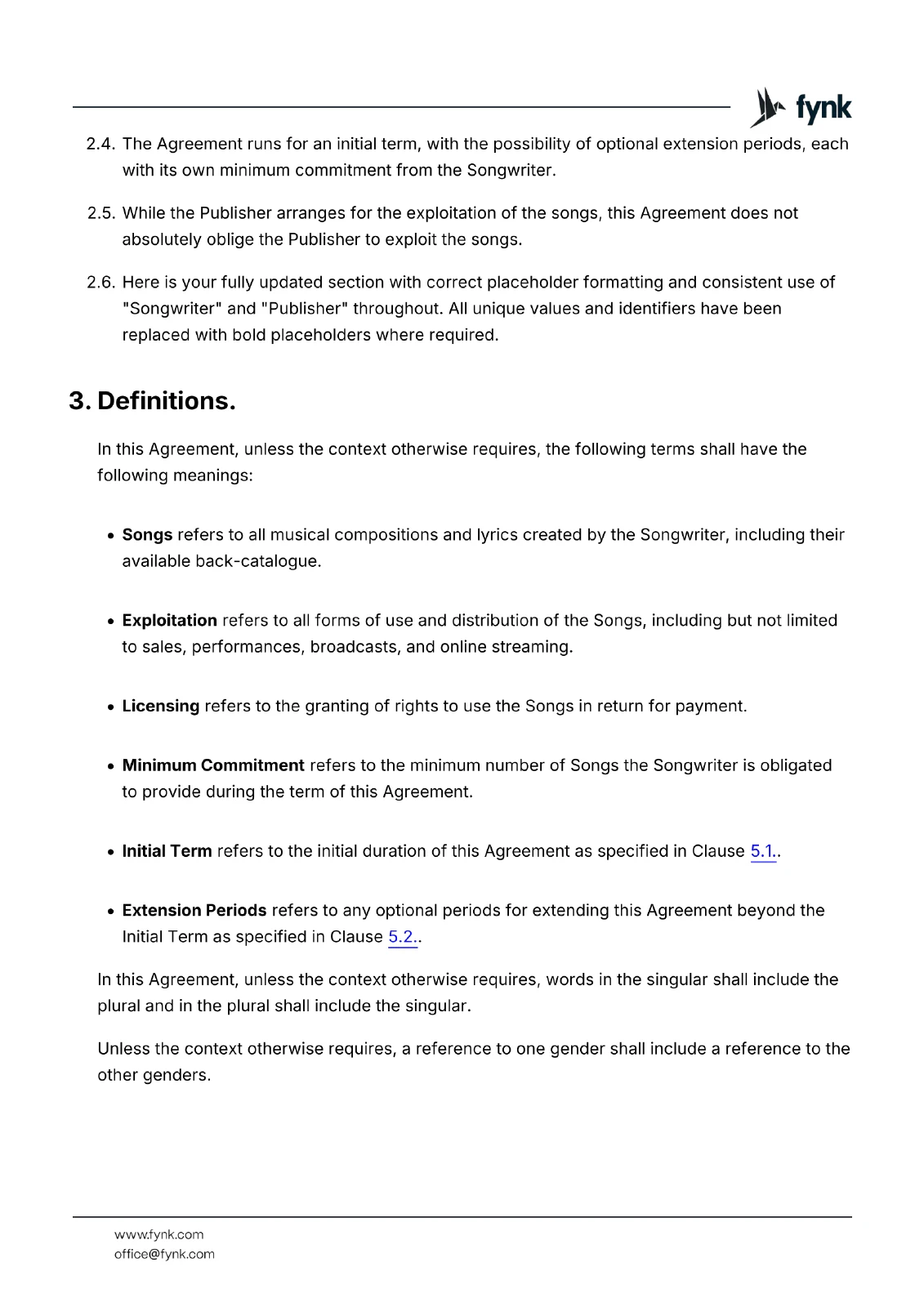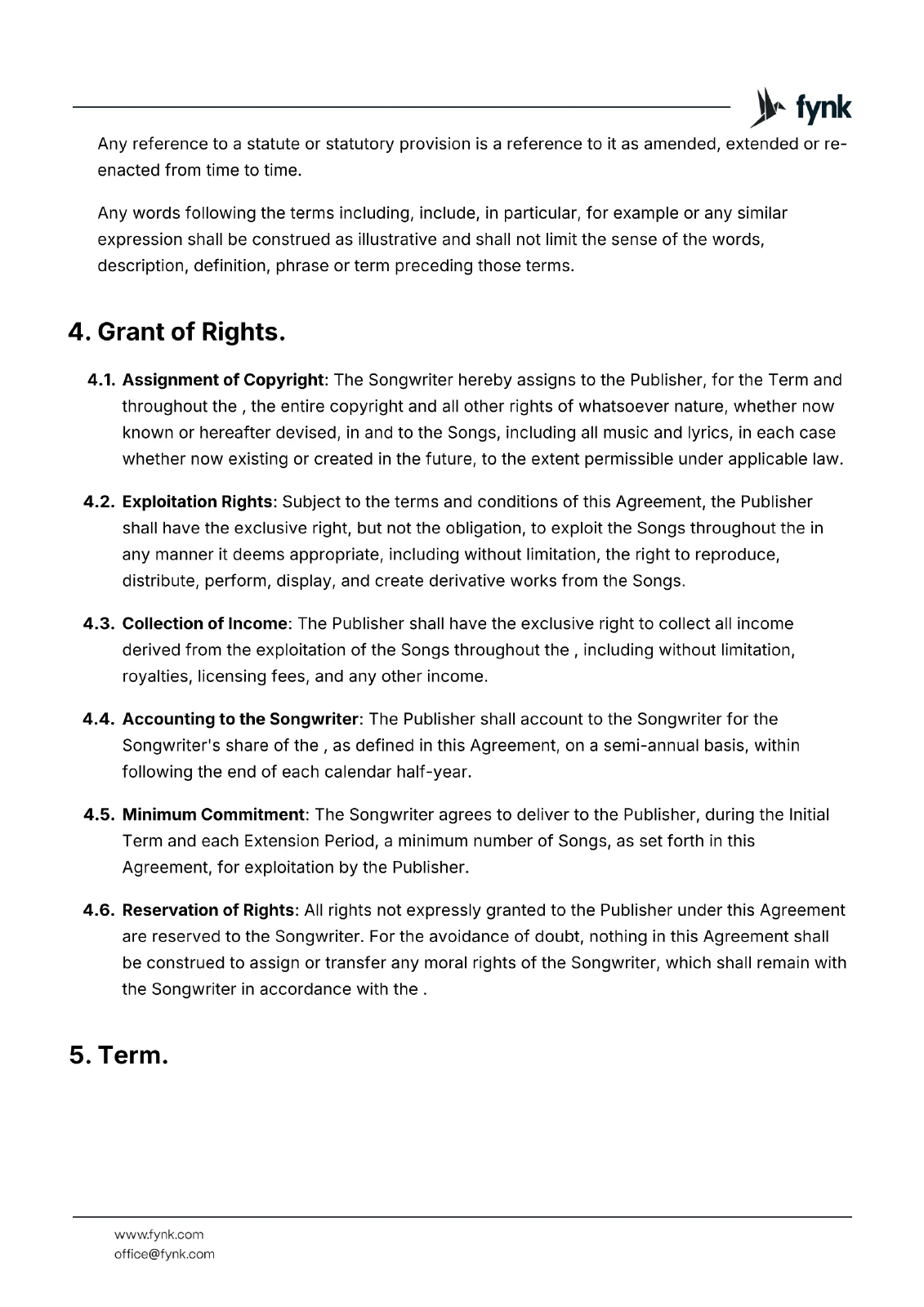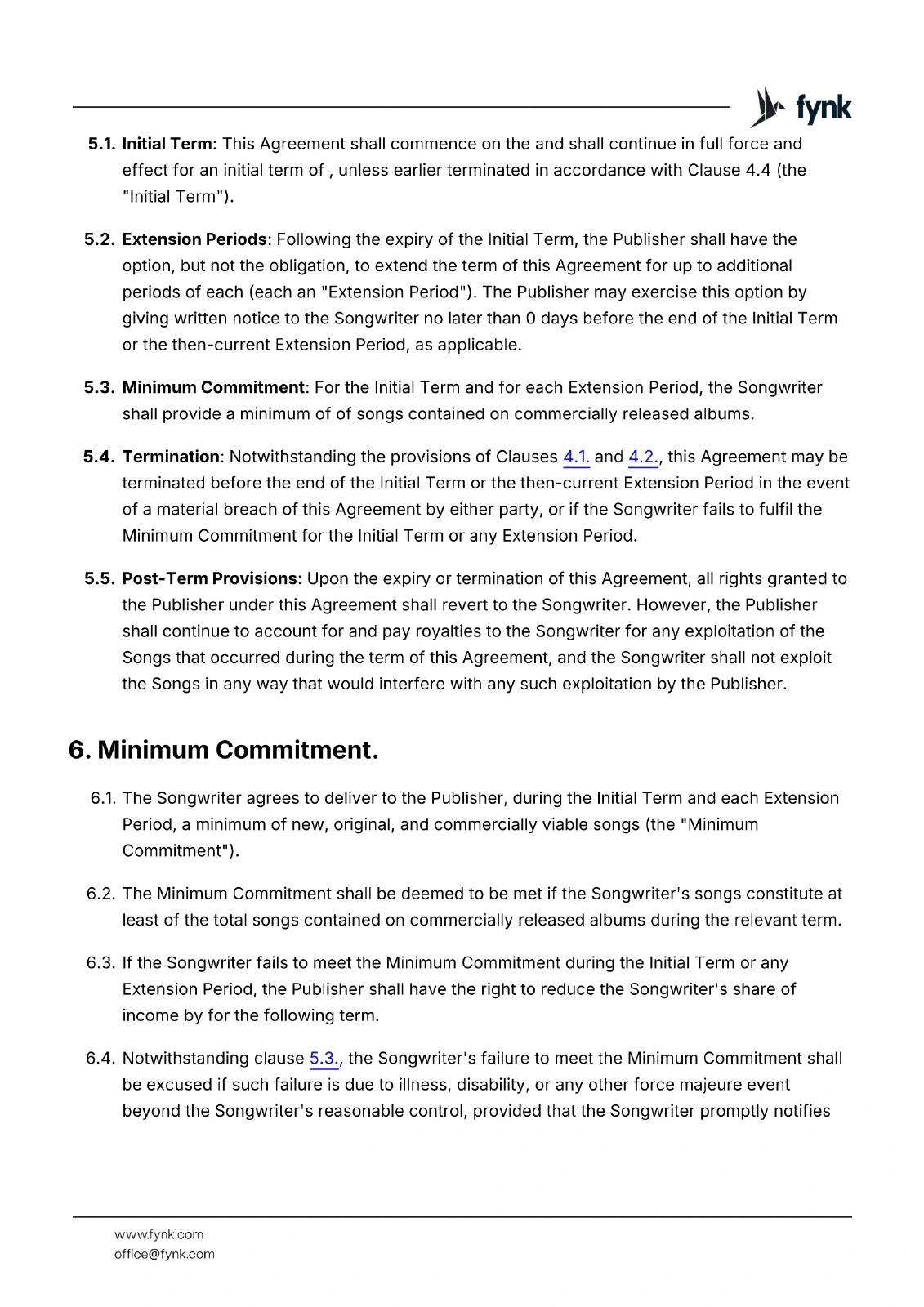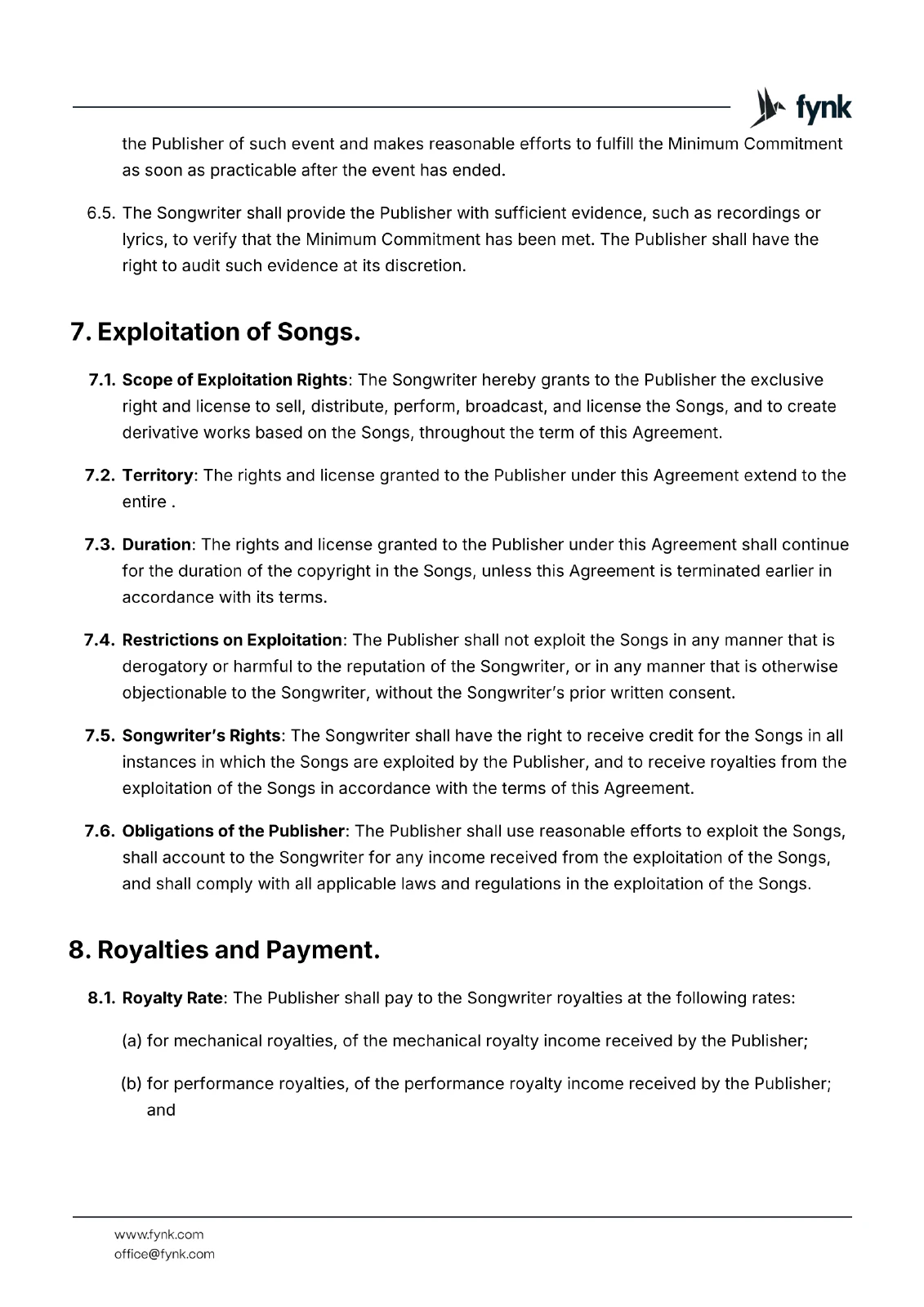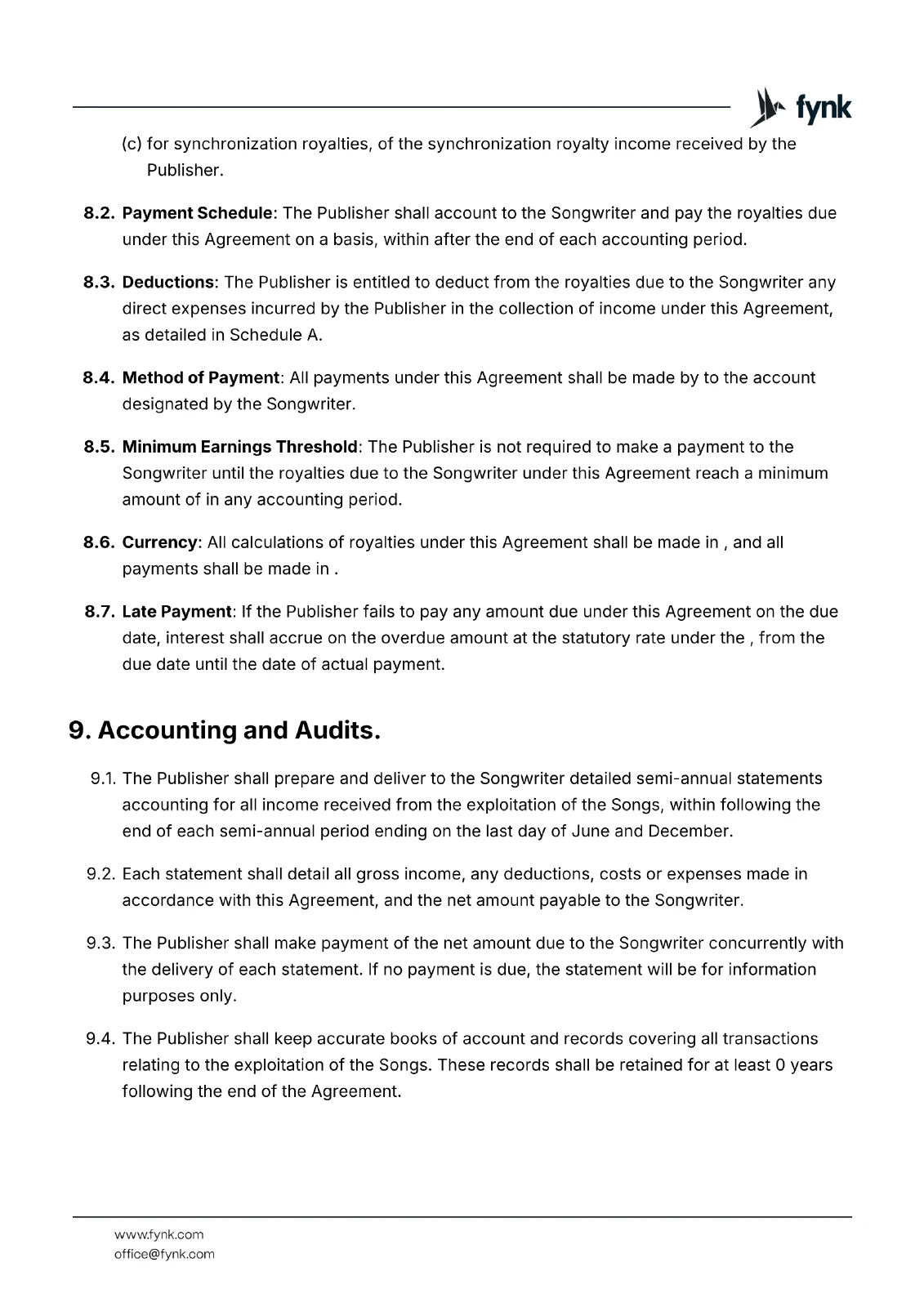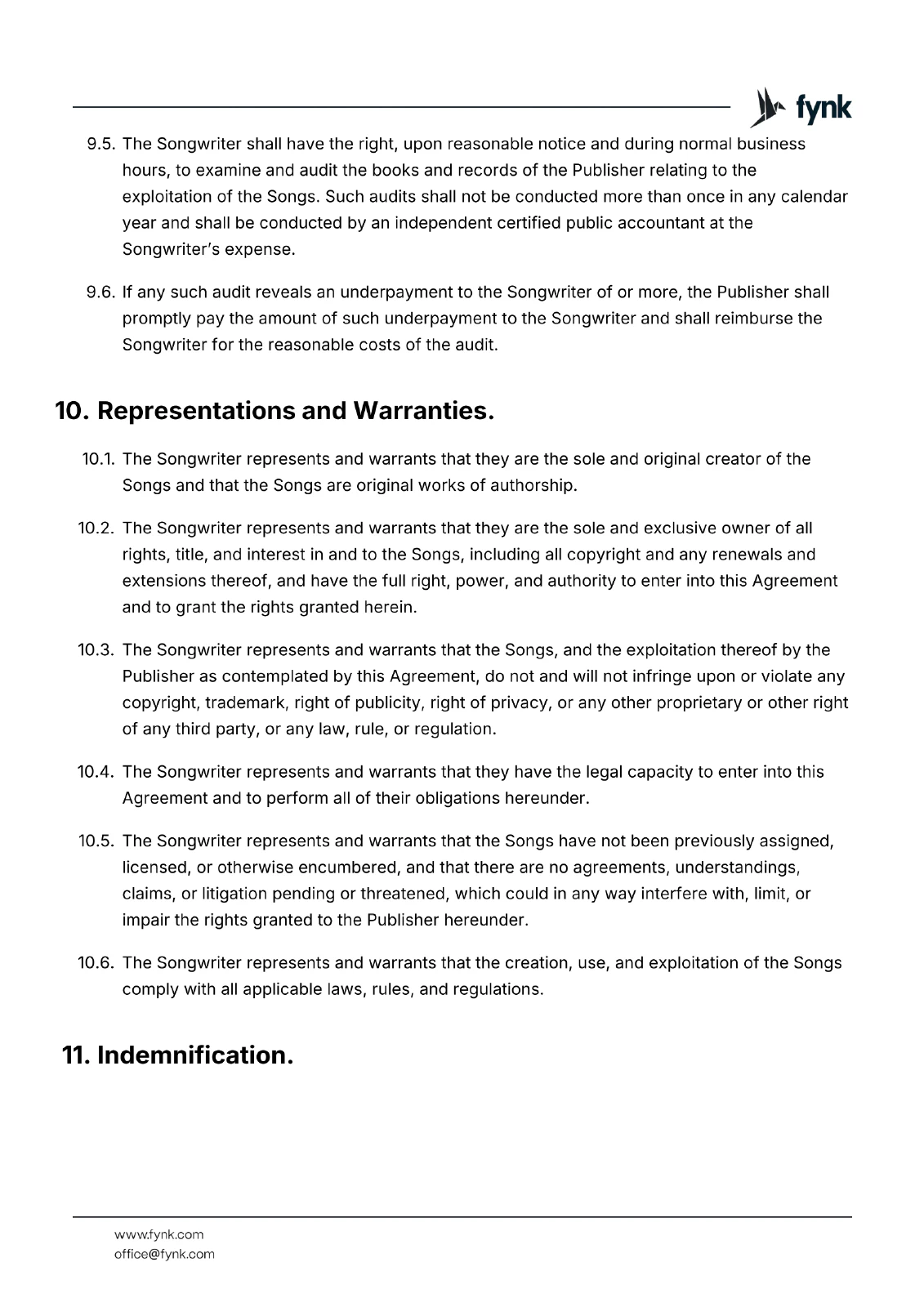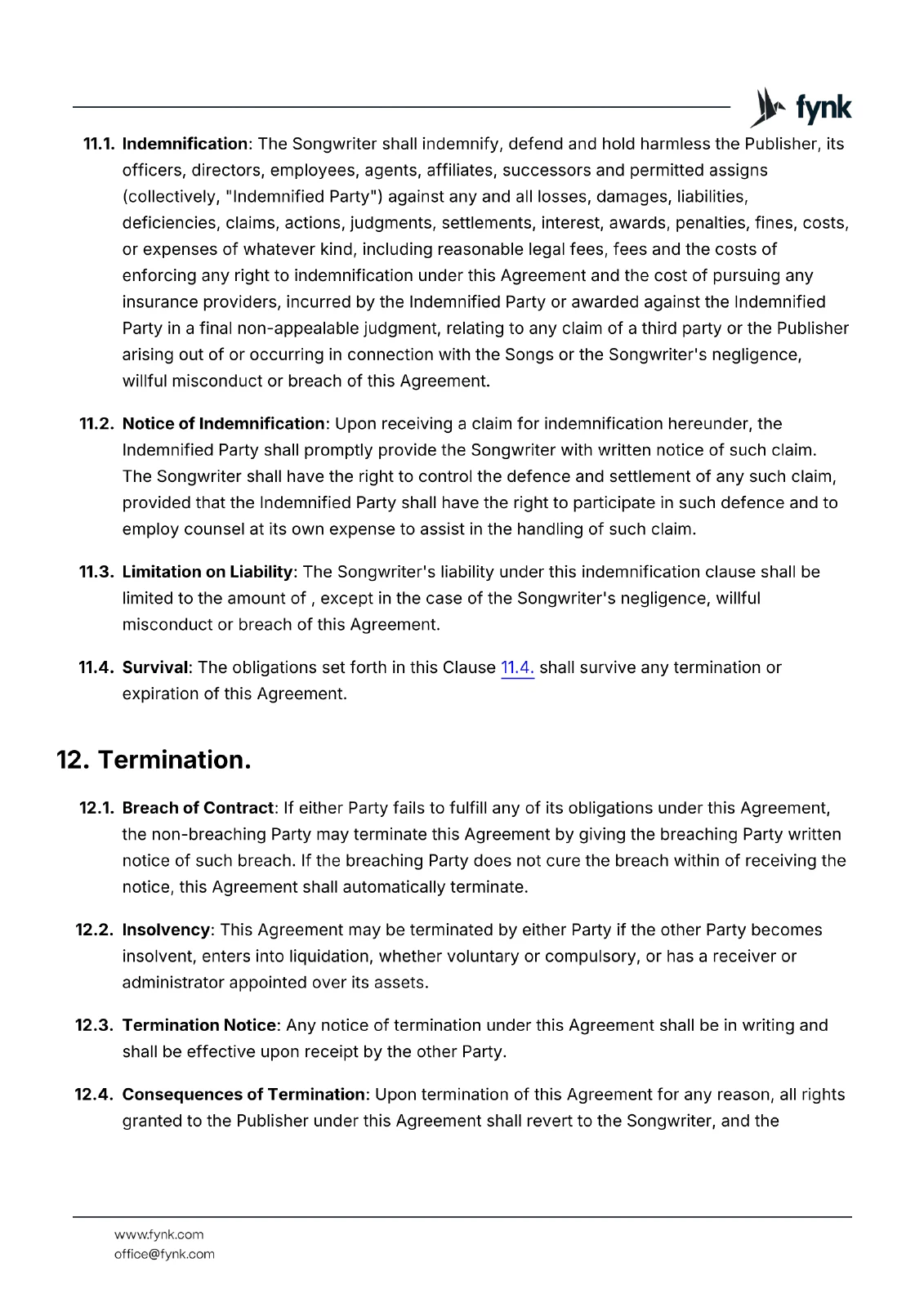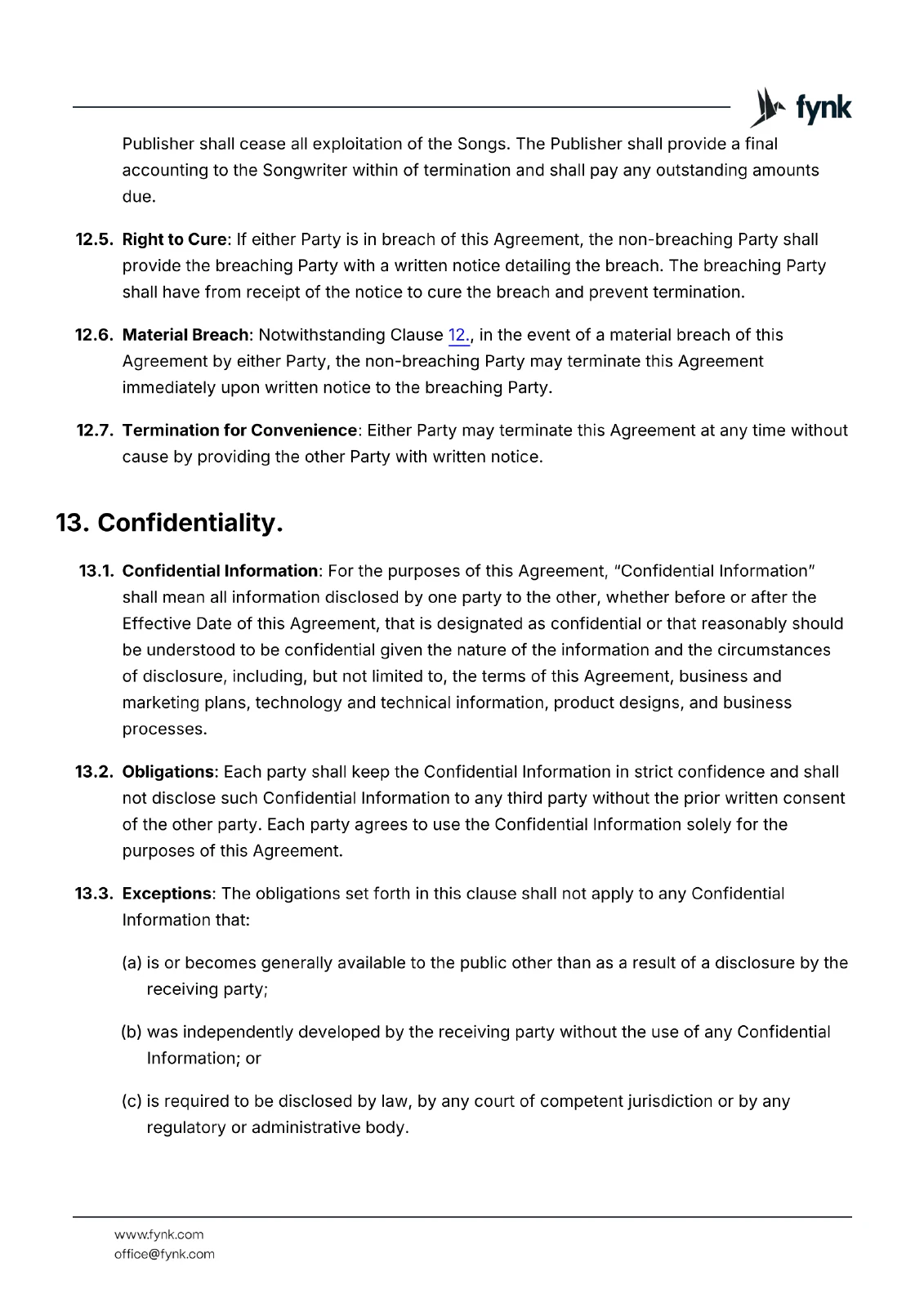Publishing Deal For Songwriter
This Agreement is made
Between:
And:
Preamble .
This is a Publishing Agreement under which the Songwriter assigns the copyright in their songs, including their available back-catalogue, to the Publisher for a limited period. In return, the Publisher arranges for the exploitation of the songs, collects the income from such licensing, and accounts to the Songwriter for an agreed share of that income. The Agreement provides for a minimum commitment from the Songwriter and runs for an initial term followed by optional extension periods.
Background.
This Agreement is entered into for the purpose of the Songwriter assigning the copyright in their songs, including their available back-catalogue, to the Publisher for a limited period.
The Publisher’s role under this Agreement is to arrange for the exploitation of the songs, collect the income from such licensing, and account to the Songwriter for an agreed share of that income.
The Songwriter agrees to a minimum commitment under this Agreement, expressed in terms of the proportion of songs contained on commercially released albums.
The Agreement runs for an initial term, with the possibility of optional extension periods, each with its own minimum commitment from the Songwriter.
While the Publisher arranges for the exploitation of the songs, this Agreement does not absolutely oblige the Publisher to exploit the songs.
Here is your fully updated section with correct placeholder formatting and consistent use of "Songwriter" and "Publisher" throughout. All unique values and identifiers have been replaced with bold placeholders where required.
Definitions.
In this Agreement, unless the context otherwise requires, the following terms shall have the following meanings:
Songs refers to all musical compositions and lyrics created by the Songwriter, including their available back-catalogue.
Exploitation refers to all forms of use and distribution of the Songs, including but not limited to sales, performances, broadcasts, and online streaming.
Licensing refers to the granting of rights to use the Songs in return for payment.
Minimum Commitment refers to the minimum number of Songs the Songwriter is obligated to provide during the term of this Agreement.
Initial Term refers to the initial duration of this Agreement as specified in Clause 5.1..
Extension Periods refers to any optional periods for extending this Agreement beyond the Initial Term as specified in Clause 5.2..
In this Agreement, unless the context otherwise requires, words in the singular shall include the plural and in the plural shall include the singular.
Unless the context otherwise requires, a reference to one gender shall include a reference to the other genders.
Any reference to a statute or statutory provision is a reference to it as amended, extended or re-enacted from time to time.
Any words following the terms including, include, in particular, for example or any similar expression shall be construed as illustrative and shall not limit the sense of the words, description, definition, phrase or term preceding those terms.
Grant of Rights.
Assignment of Copyright: The Songwriter hereby assigns to the Publisher, for the Term and throughout the , the entire copyright and all other rights of whatsoever nature, whether now known or hereafter devised, in and to the Songs, including all music and lyrics, in each case whether now existing or created in the future, to the extent permissible under applicable law.
Exploitation Rights: Subject to the terms and conditions of this Agreement, the Publisher shall have the exclusive right, but not the obligation, to exploit the Songs throughout the in any manner it deems appropriate, including without limitation, the right to reproduce, distribute, perform, display, and create derivative works from the Songs.
Collection of Income: The Publisher shall have the exclusive right to collect all income derived from the exploitation of the Songs throughout the , including without limitation, royalties, licensing fees, and any other income.
Accounting to the Songwriter: The Publisher shall account to the Songwriter for the Songwriter's share of the , as defined in this Agreement, on a semi-annual basis, within following the end of each calendar half-year.
Minimum Commitment: The Songwriter agrees to deliver to the Publisher, during the Initial Term and each Extension Period, a minimum number of Songs, as set forth in this Agreement, for exploitation by the Publisher.
Reservation of Rights: All rights not expressly granted to the Publisher under this Agreement are reserved to the Songwriter. For the avoidance of doubt, nothing in this Agreement shall be construed to assign or transfer any moral rights of the Songwriter, which shall remain with the Songwriter in accordance with the .
Term.
Initial Term: This Agreement shall commence on the and shall continue in full force and effect for an initial term of , unless earlier terminated in accordance with Clause 4.4 (the "Initial Term").
Extension Periods: Following the expiry of the Initial Term, the Publisher shall have the option, but not the obligation, to extend the term of this Agreement for up to additional periods of each (each an "Extension Period"). The Publisher may exercise this option by giving written notice to the Songwriter no later than 0 days before the end of the Initial Term or the then-current Extension Period, as applicable.
Minimum Commitment: For the Initial Term and for each Extension Period, the Songwriter shall provide a minimum of of songs contained on commercially released albums.
Termination: Notwithstanding the provisions of Clauses 4.1. and 4.2., this Agreement may be terminated before the end of the Initial Term or the then-current Extension Period in the event of a material breach of this Agreement by either party, or if the Songwriter fails to fulfil the Minimum Commitment for the Initial Term or any Extension Period.
Post-Term Provisions: Upon the expiry or termination of this Agreement, all rights granted to the Publisher under this Agreement shall revert to the Songwriter. However, the Publisher shall continue to account for and pay royalties to the Songwriter for any exploitation of the Songs that occurred during the term of this Agreement, and the Songwriter shall not exploit the Songs in any way that would interfere with any such exploitation by the Publisher.
Minimum Commitment.
The Songwriter agrees to deliver to the Publisher, during the Initial Term and each Extension Period, a minimum of new, original, and commercially viable songs (the "Minimum Commitment").
The Minimum Commitment shall be deemed to be met if the Songwriter's songs constitute at least of the total songs contained on commercially released albums during the relevant term.
If the Songwriter fails to meet the Minimum Commitment during the Initial Term or any Extension Period, the Publisher shall have the right to reduce the Songwriter's share of income by for the following term.
Notwithstanding clause 5.3., the Songwriter's failure to meet the Minimum Commitment shall be excused if such failure is due to illness, disability, or any other force majeure event beyond the Songwriter's reasonable control, provided that the Songwriter promptly notifies the Publisher of such event and makes reasonable efforts to fulfill the Minimum Commitment as soon as practicable after the event has ended.
The Songwriter shall provide the Publisher with sufficient evidence, such as recordings or lyrics, to verify that the Minimum Commitment has been met. The Publisher shall have the right to audit such evidence at its discretion.
Exploitation of Songs.
Scope of Exploitation Rights: The Songwriter hereby grants to the Publisher the exclusive right and license to sell, distribute, perform, broadcast, and license the Songs, and to create derivative works based on the Songs, throughout the term of this Agreement.
Territory: The rights and license granted to the Publisher under this Agreement extend to the entire .
Duration: The rights and license granted to the Publisher under this Agreement shall continue for the duration of the copyright in the Songs, unless this Agreement is terminated earlier in accordance with its terms.
Restrictions on Exploitation: The Publisher shall not exploit the Songs in any manner that is derogatory or harmful to the reputation of the Songwriter, or in any manner that is otherwise objectionable to the Songwriter, without the Songwriter’s prior written consent.
Songwriter’s Rights: The Songwriter shall have the right to receive credit for the Songs in all instances in which the Songs are exploited by the Publisher, and to receive royalties from the exploitation of the Songs in accordance with the terms of this Agreement.
Obligations of the Publisher: The Publisher shall use reasonable efforts to exploit the Songs, shall account to the Songwriter for any income received from the exploitation of the Songs, and shall comply with all applicable laws and regulations in the exploitation of the Songs.
Royalties and Payment.
Royalty Rate: The Publisher shall pay to the Songwriter royalties at the following rates:
for mechanical royalties, of the mechanical royalty income received by the Publisher;
for performance royalties, of the performance royalty income received by the Publisher; and
for synchronization royalties, of the synchronization royalty income received by the Publisher.
Payment Schedule: The Publisher shall account to the Songwriter and pay the royalties due under this Agreement on a basis, within after the end of each accounting period.
Deductions: The Publisher is entitled to deduct from the royalties due to the Songwriter any direct expenses incurred by the Publisher in the collection of income under this Agreement, as detailed in Schedule A.
Method of Payment: All payments under this Agreement shall be made by to the account designated by the Songwriter.
Minimum Earnings Threshold: The Publisher is not required to make a payment to the Songwriter until the royalties due to the Songwriter under this Agreement reach a minimum amount of in any accounting period.
Currency: All calculations of royalties under this Agreement shall be made in , and all payments shall be made in .
Late Payment: If the Publisher fails to pay any amount due under this Agreement on the due date, interest shall accrue on the overdue amount at the statutory rate under the , from the due date until the date of actual payment.
Accounting and Audits.
The Publisher shall prepare and deliver to the Songwriter detailed semi-annual statements accounting for all income received from the exploitation of the Songs, within following the end of each semi-annual period ending on the last day of June and December.
Each statement shall detail all gross income, any deductions, costs or expenses made in accordance with this Agreement, and the net amount payable to the Songwriter.
The Publisher shall make payment of the net amount due to the Songwriter concurrently with the delivery of each statement. If no payment is due, the statement will be for information purposes only.
The Publisher shall keep accurate books of account and records covering all transactions relating to the exploitation of the Songs. These records shall be retained for at least 0 years following the end of the Agreement.
The Songwriter shall have the right, upon reasonable notice and during normal business hours, to examine and audit the books and records of the Publisher relating to the exploitation of the Songs. Such audits shall not be conducted more than once in any calendar year and shall be conducted by an independent certified public accountant at the Songwriter’s expense.
If any such audit reveals an underpayment to the Songwriter of or more, the Publisher shall promptly pay the amount of such underpayment to the Songwriter and shall reimburse the Songwriter for the reasonable costs of the audit.
Representations and Warranties.
The Songwriter represents and warrants that they are the sole and original creator of the Songs and that the Songs are original works of authorship.
The Songwriter represents and warrants that they are the sole and exclusive owner of all rights, title, and interest in and to the Songs, including all copyright and any renewals and extensions thereof, and have the full right, power, and authority to enter into this Agreement and to grant the rights granted herein.
The Songwriter represents and warrants that the Songs, and the exploitation thereof by the Publisher as contemplated by this Agreement, do not and will not infringe upon or violate any copyright, trademark, right of publicity, right of privacy, or any other proprietary or other right of any third party, or any law, rule, or regulation.
The Songwriter represents and warrants that they have the legal capacity to enter into this Agreement and to perform all of their obligations hereunder.
The Songwriter represents and warrants that the Songs have not been previously assigned, licensed, or otherwise encumbered, and that there are no agreements, understandings, claims, or litigation pending or threatened, which could in any way interfere with, limit, or impair the rights granted to the Publisher hereunder.
The Songwriter represents and warrants that the creation, use, and exploitation of the Songs comply with all applicable laws, rules, and regulations.
Indemnification.
Indemnification: The Songwriter shall indemnify, defend and hold harmless the Publisher, its officers, directors, employees, agents, affiliates, successors and permitted assigns (collectively, "Indemnified Party") against any and all losses, damages, liabilities, deficiencies, claims, actions, judgments, settlements, interest, awards, penalties, fines, costs, or expenses of whatever kind, including reasonable legal fees, fees and the costs of enforcing any right to indemnification under this Agreement and the cost of pursuing any insurance providers, incurred by the Indemnified Party or awarded against the Indemnified Party in a final non-appealable judgment, relating to any claim of a third party or the Publisher arising out of or occurring in connection with the Songs or the Songwriter's negligence, willful misconduct or breach of this Agreement.
Notice of Indemnification: Upon receiving a claim for indemnification hereunder, the Indemnified Party shall promptly provide the Songwriter with written notice of such claim. The Songwriter shall have the right to control the defence and settlement of any such claim, provided that the Indemnified Party shall have the right to participate in such defence and to employ counsel at its own expense to assist in the handling of such claim.
Limitation on Liability: The Songwriter's liability under this indemnification clause shall be limited to the amount of , except in the case of the Songwriter's negligence, willful misconduct or breach of this Agreement.
Survival: The obligations set forth in this Clause 11.4. shall survive any termination or expiration of this Agreement.
Termination.
Breach of Contract: If either Party fails to fulfill any of its obligations under this Agreement, the non-breaching Party may terminate this Agreement by giving the breaching Party written notice of such breach. If the breaching Party does not cure the breach within of receiving the notice, this Agreement shall automatically terminate.
Insolvency: This Agreement may be terminated by either Party if the other Party becomes insolvent, enters into liquidation, whether voluntary or compulsory, or has a receiver or administrator appointed over its assets.
Termination Notice: Any notice of termination under this Agreement shall be in writing and shall be effective upon receipt by the other Party.
Consequences of Termination: Upon termination of this Agreement for any reason, all rights granted to the Publisher under this Agreement shall revert to the Songwriter, and the Publisher shall cease all exploitation of the Songs. The Publisher shall provide a final accounting to the Songwriter within of termination and shall pay any outstanding amounts due.
Right to Cure: If either Party is in breach of this Agreement, the non-breaching Party shall provide the breaching Party with a written notice detailing the breach. The breaching Party shall have from receipt of the notice to cure the breach and prevent termination.
Material Breach: Notwithstanding Clause 12., in the event of a material breach of this Agreement by either Party, the non-breaching Party may terminate this Agreement immediately upon written notice to the breaching Party.
Termination for Convenience: Either Party may terminate this Agreement at any time without cause by providing the other Party with written notice.
Confidentiality.
Confidential Information: For the purposes of this Agreement, “Confidential Information” shall mean all information disclosed by one party to the other, whether before or after the Effective Date of this Agreement, that is designated as confidential or that reasonably should be understood to be confidential given the nature of the information and the circumstances of disclosure, including, but not limited to, the terms of this Agreement, business and marketing plans, technology and technical information, product designs, and business processes.
Obligations: Each party shall keep the Confidential Information in strict confidence and shall not disclose such Confidential Information to any third party without the prior written consent of the other party. Each party agrees to use the Confidential Information solely for the purposes of this Agreement.
Exceptions: The obligations set forth in this clause shall not apply to any Confidential Information that:
is or becomes generally available to the public other than as a result of a disclosure by the receiving party;
was independently developed by the receiving party without the use of any Confidential Information; or
is required to be disclosed by law, by any court of competent jurisdiction or by any regulatory or administrative body.
Duration: The obligations under this clause shall survive termination or expiry of this Agreement for a period of .
Breach: Any breach of this clause may cause irreparable harm for which damages would not be an adequate remedy. Therefore, in addition to any other remedies available, the non-breaching party shall be entitled to seek injunctive relief.
Data Protection: Each party shall comply with its obligations under in relation to any personal data processed in connection with this Agreement.
Dispute Resolution.
In the event of any dispute arising out of or in connection with this Agreement, the Parties shall first attempt to resolve the dispute through good faith negotiations.
If the dispute cannot be resolved through negotiation within , the Parties agree to attempt to resolve the dispute through mediation. The mediator shall be appointed by mutual agreement of the Parties, or if the Parties cannot agree, by .
If the dispute cannot be resolved through mediation within , the Parties agree to submit the dispute to binding arbitration. The arbitration shall be conducted in accordance with the rules of the , by a single arbitrator appointed in accordance with those rules.
If the Parties do not agree to arbitration, or if the dispute is not suitable for arbitration, the dispute shall be resolved by litigation in the courts of , which shall have exclusive jurisdiction over any such dispute.
The law governing this Agreement and any dispute or claim arising out of or in connection with it or its subject matter or formation (including non-contractual disputes or claims) shall be the law of .
Each Party shall bear its own costs in relation to any dispute resolution proceedings under this clause. The arbitrator or court, as the case may be, may order the losing Party to pay the winning Party's costs.
The Parties agree to keep all dispute resolution proceedings and any related documents confidential, except as required by law or as necessary to enforce an arbitration award or court judgment.
Governing Law and Jurisdiction.
This Agreement shall be governed by and construed in accordance with the laws of .
Each Party irrevocably agrees that the courts of shall have exclusive jurisdiction to settle any dispute or claim arising out of or in connection with this Agreement or its subject matter or formation (including non-contractual disputes or claims).
Any dispute arising out of or in connection with this Agreement, including any question regarding its existence, validity or termination, shall be referred to and finally resolved by arbitration under the , which rules are deemed to be incorporated by reference into this clause. The number of arbitrators shall be one. The seat, or legal place, of arbitration shall be . The language to be used in the arbitral proceedings shall be .
Each Party irrevocably consents to any process in any legal action or proceedings arising out of or in connection with this Agreement being served on them in accordance with the requirements of this Agreement. Nothing contained in this Agreement shall affect the right to serve process in any other manner permitted by law.
Each Party irrevocably waives any objection which it may have now or hereafter to the laying of the venue of any suit, action or proceeding arising out of or in connection with this Agreement in the courts of and any claim that any such suit, action or proceeding has been brought in an inconvenient forum.
Miscellaneous.
Entire Agreement: This Agreement constitutes the entire agreement between the Parties relating to the subject matter hereof and supersedes all prior negotiations, representations, or agreements, either written or oral.
Amendment: No amendment, modification, or waiver of any provision of this Agreement shall be effective unless in writing and signed by both Parties.
Waiver: No failure or delay by either Party in exercising any right, power, or privilege under this Agreement will operate as a waiver thereof, nor will any single or partial exercise thereof preclude any other or further exercise thereof or the exercise of any other right, power, or privilege.
Severability: If any provision of this Agreement is found by a court of competent jurisdiction to be invalid, illegal, or unenforceable, it shall not affect the remainder of this Agreement, which shall remain in full force and effect.
Force Majeure: Neither Party shall be liable for any failure or delay in performing its obligations under this Agreement to the extent that such failure or delay is caused by a .
Third Party Rights: A person who is not a party to this Agreement shall not have any rights under the to enforce any term of this Agreement.
Notices: Any notice or other communication given under or in connection with this Agreement shall be in writing and shall be delivered by hand or sent by pre-paid first-class post or other next working day delivery service to the address of the relevant Party set out in this Agreement.
Assignment and Subcontracting: Neither Party may assign, transfer, charge, subcontract or deal in any other manner with all or any of its rights or obligations under this Agreement without the prior written consent of the other Party.
No Partnership or Agency: Nothing in this Agreement is intended to, or shall be deemed to, establish any partnership or joint venture between the Parties, constitute any Party the agent of the other Party, or authorise any Party to make or enter into any commitments for or on behalf of the other Party.
Counterparts: This Agreement may be executed in any number of counterparts, each of which when executed and delivered shall constitute an original of this Agreement, but all the counterparts shall together constitute the same Agreement.
Schedule A
Collection Costs: The Publisher may deduct the actual costs incurred in collecting the income from the exploitation of the Songs, including fees paid to collection societies or other third parties involved in the collection process.
Administrative Costs: The Publisher may deduct the actual costs incurred in administering this Agreement and managing the exploitation of the Songs, including costs related to accounting, legal services, and other overheads.
Promotion and Marketing Costs: The Publisher may deduct the actual costs incurred in promoting and marketing the Songs, including costs related to advertising, public relations, and other promotional activities.
Production Costs: If applicable, the Publisher may deduct the actual costs incurred in producing physical copies of the Songs or Albums, including costs related to manufacturing, packaging, and distribution.
Advances: The Publisher may recoup any advances provided to the Songwriter from the royalties due under this Agreement.

